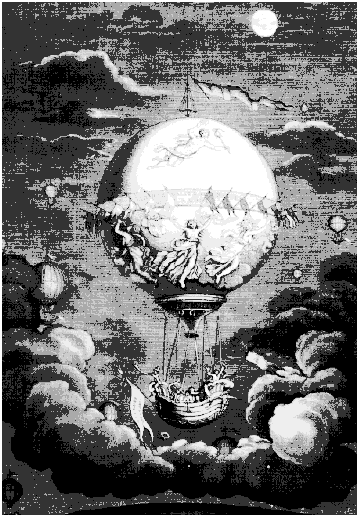Resolute
The Epic Search for
The Northwest Passage and
John Franklin, and the
Discovery of the Queen's
Ghost Ship
Martin W. Sandler
(Sterling)

These Arctic explorers were, if you ask me, dotty. All of them. With vast sums of money and manpower, with great (and expensive) vessels, they sailed into the vast unknown .. and got their limbs nipped off by frost, came down with scurvy, went blind, spent months entombed in the dark in the ice, fought with (and sometimes murdered) each other, starved, and, every so often, died, possibly of sheer boredom. How would you like to spend ten months staring at the same dumb glacier?
They presumed to be seeking the Northwest Passage. Why? According to Sandler, outside of the dubious glory of it all, it was economic. The lucrative trade with the East --- mostly in spices and opium --- had, since the days of Columbus, been forced to journey to the far south rounding the Cape of Good Hope or the Straits of Magellan. A passage through the north of Canada would cut weeks and thousands of miles from the trip. It was pure profit: such a discovery would afford a quicker passage (to get from England to the Spice Islands could take a half-a-year or more, and the mortality rate among sailors could be as high as fifty percent.) The search for the Passage was fed by a series of prizes offered by the English.
Sir John Franklin was not the first to seek it out, but he was certainly the best funded and, at the time, the best-known. The government, under the ęgis of "The Lords Commissioners of the Admiralty," had sponsored the search. Franklin departed from England 19 May 1845, cheered from the docks by 10,000 people. The two ships he commanded were the Erebus and the Terror. At Baffin Bay, they encountered two whalers. After that, the two vessels, the captain, and all aboard disappeared into the dark hole of the Arctic. It wasn't until 1858 that one of the many searchers, William Hobson, finally came upon a cairn --- a pile of stones --- that carried a sealed can which told of the last days of the captain and the crew of the two vessels. They had survived until April of 1848. And, as Sandler tells us, almost £675,000 --- $40,000,000 in today's currency, had been lost trying to find these dummies. Ten ships were also lost, along with dozens of men.

One has to admire the Victorians for sheer gall. They went, ill-prepared, into the unknown. They suffered unspeakably in the process. They made little or no use of the native Inuits who could have told them the simple rules for survival: use dogs for hauling sledges; live off the creatures of the land; protect the body with furs; use blocks of ice to build shelters; stay indoors when the furious storms arrive.
One survivor tells of a typical Arctic tempest: "Great sheets of drifting snow rolled down over the cliffs, pouring into every ravine and gorge like gigantic waterfalls. Whirlwinds shot skywards from the hilltops, spraying dense clouds of white through the air. A glacier tumbling into a valley was obscured by a vast cloak of revolving white."
And the sea?A solid mass of foam lashed the cape and was hurled through the air by the wind, breaking over the icebergs and fluttering across the sea like a thick fog, rising and falling with each gust. Earth and sea were charged with bellowing sounds ... shrieks and wailing, loud and dismal as those of the infernal blast which down in the second circle of the damned, appalled the Italian bard.
Despite the sturm und drang, or perhaps because of it, it's heavy slogging getting through Resolute. Sandler is obviously no Thomas Babington Macaulay when it comes to getting the words down. For instance, instead of sticking in footnotes, he constantly breaks the text to refer us to the back pages for expansions on the text. Worse, his sketches of the characters involved --- including "Tookoolito" and "Eskimo Joe" --- are about as labored as getting the Resolute unstuck from the pack ice there in the Barrow Straits. And he seems to go along with the cant of the times by citing many of the explorers as brave or intrepid. It was a time almost as bad as the present for foolish blood-letting --- the American Civil War, the Black Hole of Calcutta, the Crimean War's "Valley of Death." The built-in excitement of such foolishness should build a certain tension, but this is not to be found here.
If you want to get a real taste for the texture of it (albeit half-a-world and fifty years away), read The Worst Journey in the World by Apsley Cherry-Garrard. A gripping drama, indeed, written with grace. A sensible man who stated, wisely,
Polar exploration is at once the cleanest and most isolated way of having a bad time which has been devised. It is the only form of adventure in which you put on your clothes at Michaelmas and keep them on until Christmas.
--- Robert Wilder
